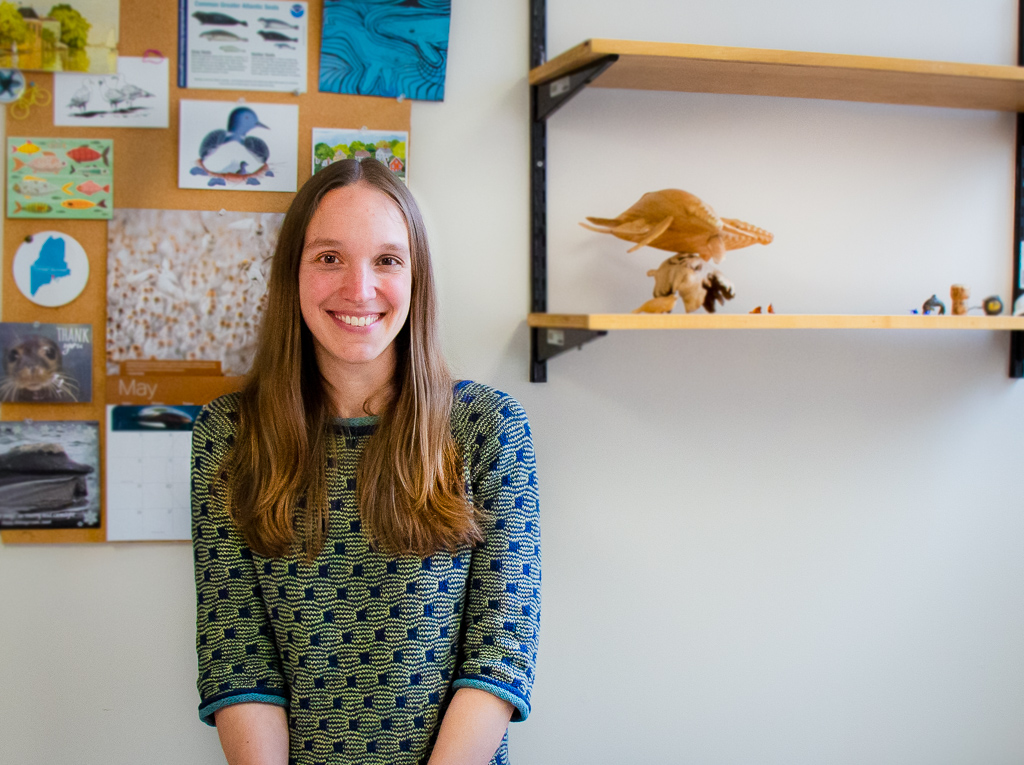
Western Passage project aims to inform future renewable energy development in Maine
Interdisciplinary multi-institution research collaboration, stakeholder engagement through Western Passage project
The Western Passage – located between Eastport, Maine and Canada – is a highly turbulent, biologically active, and socially relevant ecosystem in Eastern Maine considered one of the best locations for tidal power nationwide.
Kristina Cammen, assistant professor of marine mammal science, works alongside a team of interdisciplinary faculty and students. Their research aims to achieve physical, biological, and social science objectives – including analyzing water current data, describing the abundance and distribution of marine mammals and fish, and documenting local ecological knowledge in the Western Passage.
In this project, Cammen facilitates the development of approaches to assess the potential environmental impacts of tidal power.
Cammen, a faculty member of the University of Maine School of Marine Sciences, describes herself as a molecular ecologist with a strong interest in marine mammal conservation. This role allows for opportunities to explore the many different issues around marine mammals in the state of Maine and to forge many new partnerships – which led to her involvement in the Western Passage project.
Community involvement and engagement are vital aspects of this research collaboration. Cammen says the wealth of local knowledge will be incorporated in understanding and finding solutions to local problems related to the project.
Beyond the data being collected specific to the Western Passage, the interdisciplinary approach and environmental monitoring approaches being developed will be beneficial to other communities considering tidal power development.
“Our research projects will help inform future renewable energy development in Maine and beyond,” says Cammen.
Interdisciplinary, undergraduate teamwork
Another important aspect is the involvement of graduate and undergraduate student researchers. Cammen believes that apart from research experiences, the students will gain experience working with interdisciplinary teams, as well as with industrial and community partners. This training will be vital for their future careers.
The project has various dimensions of impacts – including social and economic impacts on the local communities, as well as the environmental impacts through potential future policy changes – informed by research results.
“In the more immediate term, I am excited for the future cross-campus and interdisciplinary research collaborations that could arise from this project, and hope that at the end of this funding period, our students will feel well-trained in interdisciplinary environmental science and understand its value to policy-making,” Cammen says.
The project is funded by the University of Maine System Research Reinvestment Fund through the Interdisciplinary Undergraduate Research Collaborative (IURC) program. Various institutions and departments are collaborating in this multi-dimensional project, including the School of Marine Sciences, Department of Wildlife, Fisheries, and Conservation Biology, Civil and Environmental Engineering, Mechanical Engineering, and Marine Biology at the University of Maine, Machias. Other partners include Maine Sea Grant and Ocean Renewable Power Company.
Cammen enjoys the interdisciplinary and collaborative nature of this work.
“I think it makes for a richer and more enjoyable research experience.”
This project is a continuation and evolution of work that started more than a decade ago with funds from the US Department of Energy and was subsequently supported by multiple funding sources including NSF, ORPC, Maine Sea Grant, MAFES, the Mitchell Center for Sustainability Solutions, and the School of Marine Sciences.
Author: Baidehi Roy
Media Contact: Christel Peters, 207.581.3571
